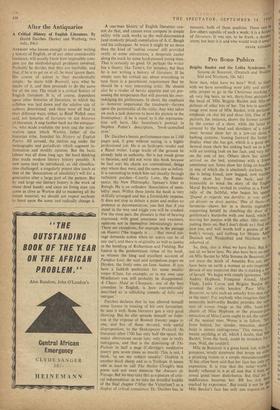After the Antiquaries
ANYBODY who knows enough to consider writing history of English, or of any other considerable literature, will usually know how impossibly com- plex are the methodological problems involved. Probably he decides that they are insoluble, and that, if he is to get on at all, he must ignore them. His course of action is then paradoxically simple: he starts with Beowulf, says what he thinks of it, and then proceeds to do the same for all the rest. The result is a critical history of English literature. It is, of course, dependent upon other histories of literature, in which the syllabus was laid down and the relative size of authors determined; and these were all bad in their different ways, either, as Rene Welick once said, not histories of literature or not histories of literature. A step farther back are the antiquar- ies, who made available the texts and the infor- mation upon which Warton, father of the historian tribe, founded his History of English Poetry. All around, the shelves sag under the monographs and periodicals which augment in- . formation and modify opinion. But the basic labour was all done long ago, the hard thinking that made modern literary history possible. A new name may be introduced, an old classifica- tion challenged; a singularly potent idea (such as that of the 'dissociation of sensibility') will for a generation alter a large part of the pattern. But by and large our literary history is the work of many dead hands; and since no living man can come as close as Warton did to mastering all the extant material, we should not expect anybody to burst upon the scene and radically change it. A one-man history of English literature can- not do that, and cannot even compete in simple utility with such works as the well-documented (and modestly priced) compilation of A. C. Baugh and his colleagues. At worst it might be no more than the kind of 'outline course' still provided orally at some universities, a desperate canter along the track by some hard-pressed young man. That is certainly no good. Or perhaps the writer has a theory, like Taine's, for instance; but then he is not writing a history of literature. If he simply says his critical say about everything in turn there is a paramount requirement that he should be a very interesting critic. He should also be a reader of heroic appetite and yet pos- sessing the temperance that will prevent his over- indulging his preferences. In short, the emphasis is—however impersonal the treatment—thrown upon the personality of the critic. Any who takes on such a task deserves to have his picture in the frontispiece: if he is equal to it the representa- tion will have, like Saintsbury's portrait in Stephen Potter's description, 'book-quenched eyes.'
Dr. Daiches's heroic performance runs to 1,100 pages and, it goes without saying, is a highly professional job. He is an hydroptic reader and a fluent writer. Large tracts of the ground he already held in authority. He is not much given to theories, and did not write this book because he had one; his charts are conventional, things stay where they were, and the same size as before. It is interesting to watch him sail steadily through turbulent patches—Courtly Love, the Renais- sance. the New Philosophy, Spenser's letter to Ralegh. He is an orthodox 'dissociation of sensi- bility' man. Within these limits the book is very skilfully arranged and has a formidable impetus. It does not stop to debate a point and makes no pretence at documentation; you feel that if you stand in the way and niggle you will be crushed. For the most part, the pleasure is that of hearing expressed, with great assurance and exactness, opinions not in themselves intoxicatingly novel. There are exceptions, for example in the passage on Handet ('the tragedy is . . . that moral out- rage demands action when no action can be of any use'), and there is originality as well as justice in the handling of Richardson and Fielding. But Justice is the predominant virtue of the book, as witness the long and excellent account of Paradise Lost, the neat and scrupulous pages on Dryden, the lively ones on Jane Austen. If you have a faddish preference for some smaller writer (Clare, for example, or in my own case Middleton) you will probably be disappointed. A Chaste Maid in Cheapside, one of the best comedies in English, is here conventionally described as 'a rollicking comedy of folly and intrigue.'
Daiches declares that he has allowed himself some licence in treating of his own favourites; he uses it well. Scots literature gets a very good showing. But he also spreads himself on John- son at the expense of Boswell (twenty pages to one, and five of those devoted, with useful disproportion, to the Shakespeare Preface). As literature after 1700 has only half the space, the major aberrations occur late; only one is really outrageous, and that is the dismissing of The Prelude in half a page (Coleridge's meditative poetry gets seven times as much). This is not, I think. `to see my subject steadily.' Godwin is another black sheep, and so is Trollope. It seems odd at least to call The Bothie Clough's best poem and not even mention the Amours de Voyage. But we may take this as a gesture of criti- cal independence, as we take the dreadful huddle of the final chapter ('After the Victorians') as a display of critical conscience. Dr. Daiches has, in measure, both of these qualities. There can be few others capable of such a work; it is a historY of literature. It was not, to be frank, a desider; atum; but here it is and who would wish it RWRY' FRANK KERM11003


































 Previous page
Previous page